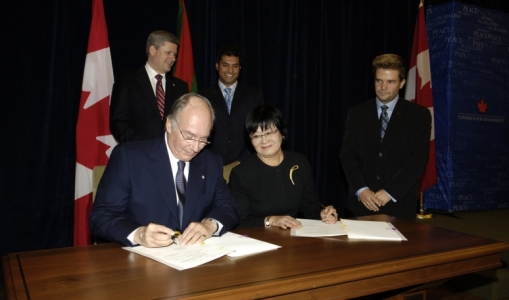Aga Khan announces think-tank for Ottawa-2004-05-21
He didn't attract as much attention as the Dalai Lama. He rarely does. But by the time he had slipped in and out of Ottawa on his private jet, the Aga Khan, spiritual leader of the world's 15 million Imami Ismaili Muslims, had given the city, and the country, a major gift.
The Geneva-born imam, who is now based just outside Paris, has announced the creation of the Global Centre for Pluralism, which will be based in Ottawa.
The Aga Khan said he picked Canada for the centre, which he described as a "secular, non-denominational,"institute for research and education, because Canada is so well-placed to export the ingredients of successful democracy.
"Canada offers the world an example of meshing, and thereby fortifying, civil society with merit from all segments of its population," he said during a speech Wednesday night at the Canadian Museum of Civilization, where he made the announcement. "You are, hence, able to harness the best from different groups because your civil society is not bound by a specific language or race or religion.
"My intention is not to embarrass you with too rosy a picture of the Canadian mosaic as if it were free of all tension," he continued. "But you have the experience, an infrastructure grounded in wisdom, and the moral wherewithal to be able to handle challenges to your social and political fabric."
According to McGill University sociology professor Morton Weinfeld, who studies race relations, the world's perspective of Canada is one that might take a lot of Canadians by surprise.
"For many Canadians this is sometimes hard to believe. It sounds like a motherhood statement, but, remarkably, most of the rest of the planet seems to believe it," Mr. Weinfeld said.
"Sometimes we in Canada might not have that view because we have a sense of some of the problems that we continue to deal with. But for the rest of the world, the impression seems to exist that we are clearly on the right track and that they have something to learn from us. And I think that can help this centre in its operations."
Since Sept. 11, 2001, the Aga Khan, steadfastly neutral in politics, has been a much sought-after voice in discussions about Islam. He has made an effort to oblige.
"It is urgent that the West gain a better understanding of the Islamic world," he said in the speech, "which ... is a hugely diverse collectivity of civilizations that has developed, and continues to evolve."
His vision of Islam is one that embraces engagement with other religions, he said, adding that too many people have an impression that Islam is "both opposed to, and incapable of, pluralism."
His vision for slowly cultivating democracy across the world, partly through the help of Canadian expertise, is based on three things, he said: meritocracy, pluralism and civil society.
Pluralism, the concept at the heart of the new centre, is a simple, but crucial, idea that's essential for building peace.
"Pluralism means people of diverse backgrounds and interests coming together in organizations of varying types and goals, for different kinds and forms of creative expression," he said.
The centre will send experts around the world to help achieve those goals.
Judith Maxwell, president of the Canadian Policy Research Networks, one of the largest think-tanks in Canada, said the centre will "greatly enrich the intellectual environment here in Ottawa."
"It's going to be quite large in relation to the other think-tanks we have in the country," she said, "which means in the long-term it will have quite a lot of clout, I think, on the way we think about ourselves as a country and the kind of intellectual ferment that we have in the social sciences and the humanities."
The backing of the wealthy leader, with an expected investment by the Canadian government, will mean the centre will be, right from its inception, one of the largest think-tanks in the country, rivalling the Fraser Institute and the CPRN. Ms. Maxwell said her institution has an annual budget of $3 million to $4 million. In time, the pluralism centre is expected to grow and become Canada's largest think-tank.
According to Mr. Weinfeld, the Aga Khan, who received the hereditary title as a student at Harvard in 1957, doesn't draw the same attention as the Dalai Lama, perhaps because of his focus on the practical.
"It doesn't lend itself to the same kind of aura," he said.
On the web for seven-day subscribers: Read the text of the speech by the Aga Khan at the Canadian Museum of Civilization. www.ottawacitizen.com
Photo: Nicki Corrigall, the Ottawa Citizen / The Aga Khan, who gave the keynote speech at the Governor General's Leadership Conference at the Canadian Museum of Civilization Wednesday evening, announced the creation in Ottawa of the Global Centre for Pluralism, a 'secular, non-denominational' centre for research and education.
- 6448 reads
 Ismaili.NET - Heritage F.I.E.L.D.
Ismaili.NET - Heritage F.I.E.L.D.